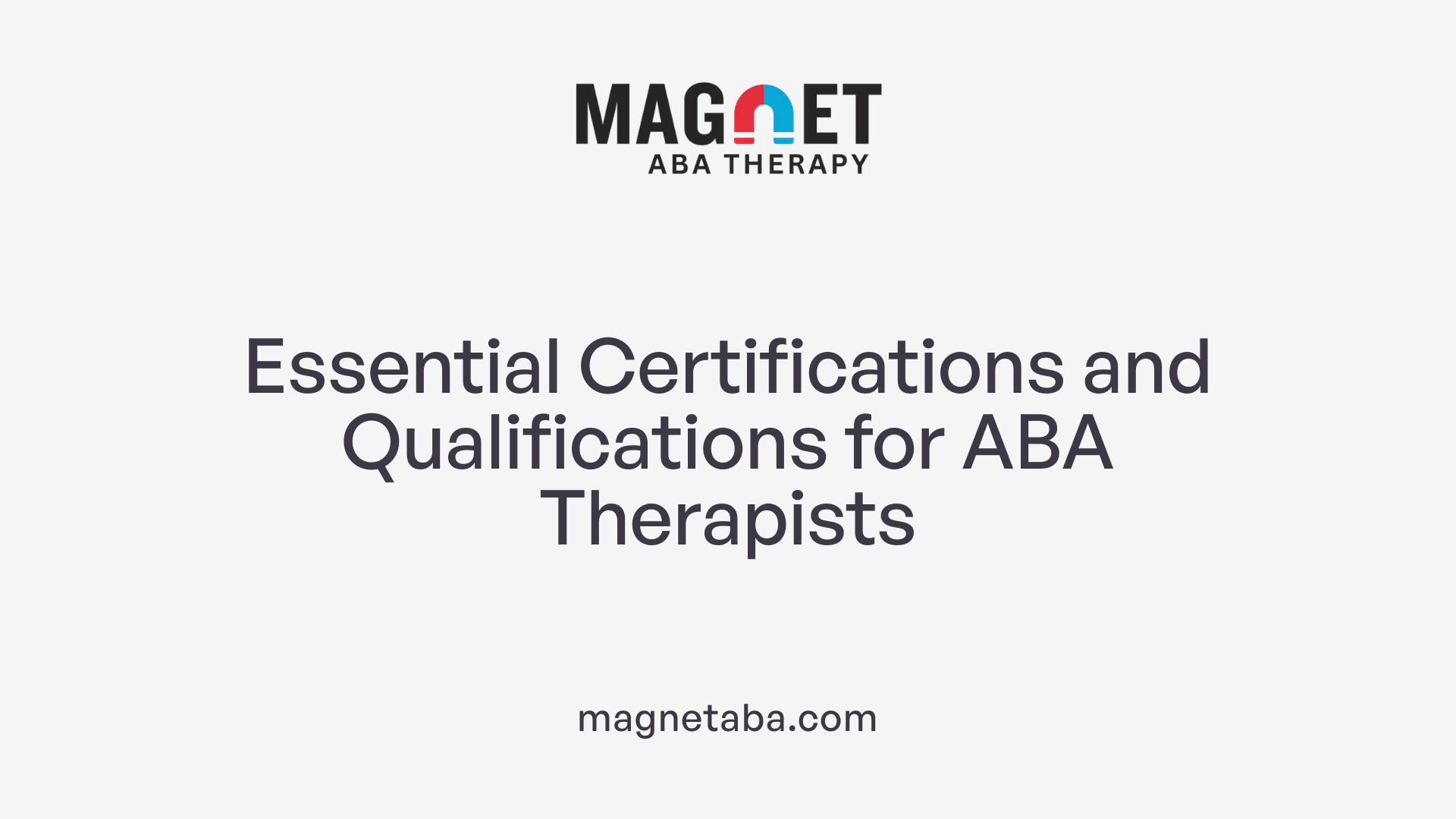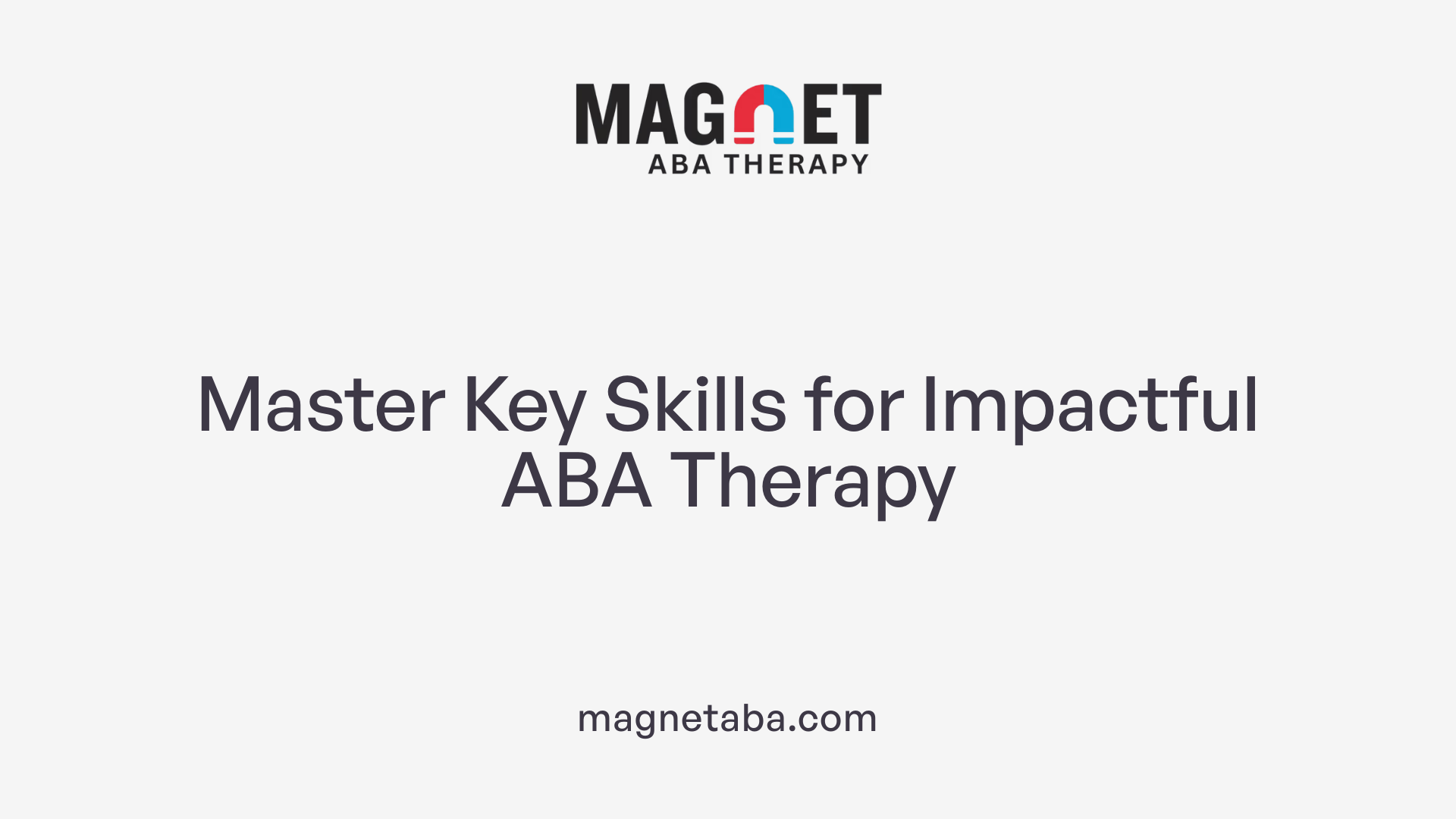Understanding the Essentials of Effective ABA Therapy
Applied Behavior Analysis (ABA) is a scientific approach committed to improving behaviors and skills, especially for children with autism spectrum disorder. The effectiveness of ABA therapy heavily depends on the competence, personal qualities, and professional training of the therapist. This article explores what makes a good ABA therapist, examining key traits, qualifications, and best practices that ensure optimal outcomes for clients and their families.
Core Personal Traits of a Successful ABA Therapist

What qualities and personal traits are important for an effective ABA therapist?
An effective ABA therapist exemplifies a blend of compassionate personal qualities and professional competence. Patience and perseverance are foundational, as progress can often take months or even years, especially with children on the autism spectrum. These traits enable therapists to maintain a calm and consistent approach, even when faced with challenging behaviors.
Empathy and compassion are crucial in understanding the child's perspective and building trusting relationships. A therapist who genuinely cares can better motivate the child and foster a supportive environment conducive to learning.
Engagement and enthusiasm are equally important. Therapists should be energetic, fun, and able to capture the child's interest, making sessions enjoyable and meaningful. A positive attitude encourages children to participate actively and enjoy the therapy process.
Strong communication skills are essential for explaining techniques clearly to children and parents alike. An effective therapist adapts their language and approach based on the child's developmental level and needs, ensuring understanding and collaboration.
Adaptability and flexibility allow therapists to modify strategies as needed, responding to the child’s reactions and changing circumstances. This personalized approach enhances the relevance and effectiveness of interventions.
Professionally, a good ABA therapist is well-trained, often holding certifications such as Registered Behavior Technician (RBT) or Board Certified Behavior Analyst (BCBA). They have practical experience implementing evidence-based techniques like positive reinforcement and behavioral shaping, tailored to individual client goals.
Collaborative skills are also vital. Therapists work closely with parents and multidisciplinary teams to develop and adjust personalized treatment plans, ensuring consistency and maximizing progress.
Overall, a successful ABA therapist combines these personal traits with professional expertise. Their compassionate, patient, adaptable, and enthusiastic demeanor creates a motivating environment that supports meaningful behavioral change and skill development in children.
Qualifications and Certifications Essential for Effective Practice

What qualifications, training, and certifications are necessary to be an effective ABA therapist?
Becoming a proficient ABA therapist involves a combination of educational credentials, specialized training, and formal certification. Typically, individuals should hold at least a bachelor's degree in fields such as psychology, education, or behavioral sciences. This foundational education provides essential knowledge about human development and learning principles.
For those aiming to advance in the field and take on roles like a Board Certified Behavior Analyst (BCBA), a master's degree in Applied Behavior Analysis, Psychology, or related domains is required. This advanced education is supplemented with completing a Verified Course Sequence (VCS), which covers core concepts of ABA.
In addition to education, hands-on experience through supervised fieldwork is crucial. Candidates must complete between 1,500 to 2,000 hours of supervised practice under the guidance of a qualified BCBA. This fieldwork ensures practical application of principles, data collection skills, and direct client interaction.
Certifications are attained through the Behavior Analyst Certification Board (BACB). The primary credential, BCBA, involves passing a rigorous exam that tests knowledge across various ABA topics. There are also entry-level certifications like the Registered Behavior Technician (RBT), which requires completing 40 hours of training and passing a competency assessment. The BCaBA (Board Certified Assistant Behavior Analyst) certification requires a bachelor’s degree and additional coursework.
Maintaining certification involves ongoing education. For example, BCBAs need to earn continuing education units (CEUs) regularly to stay current with research developments and ethical practices. Ethical standards are a fundamental aspect of ABA practice, and adherence to these standards is mandatory.
Finally, licensure requirements vary by state or country. Some regions require practitioners to hold a state license to practice legally. These licensure standards often include background checks, specific educational credentials, and ongoing professional development.
Here is an overview of these qualifications:
| Certification Level | Education Requirement | Experience | Exam | Continuing Education | Additional Notes |
|---|---|---|---|---|---|
| RBT (Registered Behavior Technician) | High school diploma | 40 hours training, supervised competency | Yes | Yes | Entry-level role, supports BCBAs |
| BCaBA | Bachelor’s degree | 1,000 hours supervised fieldwork | Yes | Yes | Mid-level credential |
| BCBA | Master’s or higher degree | 1,500 hours supervised practice | Yes | Yes | Full professional certification |
| State Licensure | Varies | Varies | Varies | Varies | Ensures legal practice, depends on local regulations |
Overall, the pathway to becoming an effective ABA therapist combines robust education, practical experience, formal certification, and compliance with ethical and legal standards. This comprehensive approach ensures practitioners are well-equipped to deliver evidence-based, individualized behavioral interventions.
Skills and Techniques That Define Effective ABA Therapy

What are the key skills and qualities needed for ABA therapists to provide effective treatment?
A competent ABA therapist combines a variety of skills and qualities to deliver impactful therapy. Strong communication skills are crucial, enabling therapists to explain concepts clearly, engage with clients effectively, and collaborate with families. Patience and adaptability allow therapists to handle challenging behaviors calmly and modify strategies as needed, ensuring interventions are tailored to each child's unique needs.
A deep understanding of behavior analysis principles forms the foundation of effective therapy. This includes mastery of reinforcement techniques, prompting, and the use of evidence-based practices like Discrete Trial Training (DTT), Natural Environment Teaching (NET), and Pivotal Response Treatment (PRT). These methodologies focus on increasing helpful behaviors and reducing harmful ones through structured, engaging, and individualized interventions.
Data collection and analysis are vital in monitoring progress. Therapists should meticulously gather data during sessions, analyze trends, and adjust treatment plans accordingly. This scientific approach ensures that interventions remain effective and goal-oriented.
Personalizing interventions is essential; understanding each child's abilities, interests, and challenges helps develop strategies that are both motivating and suitable. Therapists must also foster generalization of skills, ensuring that learned behaviors occur across different environments like home, school, and social settings.
In addition to technical skills, qualities like compassion, enthusiasm, and professionalism motivate clients and build trust. Ethical standards and ongoing training further enhance therapist effectiveness. Overall, a blend of technical expertise, interpersonal skills, and dedication characterizes the most successful ABA therapists.
Evaluating and Selecting the Right ABA Therapist

How can one evaluate and choose a qualified ABA therapist?
Selecting the right ABA therapist is crucial for effective treatment outcomes. The first step is to verify that the therapist holds certification from the Behavior Analyst Certification Board (BACB). Common credentials include a Board Certified Behavior Analyst (BCBA) or a BCaBA. These certifications ensure the therapist has completed rigorous training, including coursework, supervised fieldwork, and passing a national exam.
In addition to certification, confirming licensure in your state, if required, adds an extra layer of assurance that the therapist meets professional standards. Experience is another important factor. Look for professionals who have worked with children of similar age, developmental level, and behavioral challenges as your child. Experience working with autism spectrum disorder (ASD), ADHD, or similar conditions enhances the therapist’s ability to tailor effective interventions.
A personalized treatment plan based on thorough assessments is essential. Effective ABA therapists develop individualized strategies that address the root causes of behaviors, rather than just reacting to symptoms. Ask about their approach to treatment, especially how they design, implement, and modify plans according to progress.
Data collection and consistent progress monitoring are fundamental to ABA. The therapist should regularly gather data on your child's behaviors and report these findings transparently, using them to adjust therapy strategies. This process ensures that interventions are effective and responsive to your child's evolving needs.
Parental involvement is vital. The best ABA providers actively include parents in developing goals, training, and progress updates. Clear, ongoing communication about your child's development fosters trust and helps reinforce strategies outside therapy sessions.
Finally, reputation matters. Seek out providers with positive reviews and endorsements from other families or professionals. An environment that is nurturing, professional, and committed to ethical standards supports better learning and behavioral improvements.
By carefully assessing these aspects—certification, experience, approach, data practices, parent collaboration, and reputation—you can select a therapist best suited to foster your child's growth and skill development. Ensuring they are empathetic, knowledgeable, and dedicated will set the foundation for meaningful progress.
Questions to Ask When Interviewing or Evaluating an ABA Therapist

What should parents or caregivers ask when interviewing or evaluating an ABA therapist?
Choosing the right ABA therapist is essential for effective treatment and positive outcomes. Parents should begin by confirming the therapist’s credentials, such as BCBA certification, the educational background, and experience working with children with similar needs. It’s important they understand the therapist’s approach—what specific techniques they use, how they develop personalized treatment plans, and how they adapt these plans as the child progresses.
Supervision plays a critical role in quality ABA therapy. Parents should ask about the frequency of oversight by a qualified BCBA and how involved the supervising professional is in day-to-day therapy. It’s also beneficial to know how the therapist involves families—whether through training, regular updates, or coaching—so that caregivers can support skills outside sessions.
Handling challenging behaviors ethically is a crucial aspect of ABA. Parents should inquire about strategies the therapist employs, focusing on positive reinforcement and functional assessments rather than punitive measures. Transparency about how progress is measured, how data is collected, and how communication is maintained helps ensure the provider aligns with the child’s best interests and ethical standards.
Additional questions might include the therapist’s availability, their methods for ensuring skills generalize across settings, and how they incorporate family preferences or cultural considerations. These questions help families find a dedicated, qualified, and compassionate professional who can deliver tailored and effective ABA therapy.
The Impact of Experience and Continuous Training on Therapy Effectiveness
What role do experience and training play in the effectiveness of ABA therapy?
Experience and specialized training are fundamental to the success of ABA therapy. They equip therapists with the skills necessary to accurately implement evidence-based techniques and tailor interventions to meet the unique needs of each individual client.
Board-Certified Behavior Analysts (BCBAs) typically hold advanced degrees, such as a master’s or PhD, in behavior analysis, psychology, or education. They have completed extensive coursework, passed a thorough certification exam, and accumulated at least 1,500 hours of supervised experience. This rigorous preparation ensures that they understand the scientific principles underlying ABA and can develop effective, personalized treatment plans.
Therapists with practical experience are better at recognizing subtle behavioral cues and adjusting strategies in real-time. Their hands-on knowledge allows them to troubleshoot challenges swiftly and refine methods based on the child's progress.
Supervision plays an essential role, as experienced BCBAs oversee the work of less experienced therapists, such as Registered Behavior Technicians (RBTs) and BCaBAs. This oversight guarantees that treatment remains consistent, scientifically grounded, and ethically sound.
Moreover, ongoing professional development helps therapists stay current with the latest research, techniques, and guidelines in ABA. Attending workshops, conferences, and training courses allows professionals to incorporate new evidence into their practice.
Staying updated with research trends is vital because the field of ABA continually evolves as new studies shed light on better intervention methods. For example, advances in communication strategies, data collection technologies, and behavioral modifiers can significantly enhance therapy quality.
Adapting strategies based on data collected during therapy sessions is another critical aspect. Experienced therapists analyze progress data and modify interventions accordingly, ensuring they are responsive to the child's development and changing needs.
In summary, the combination of hands-on experience, rigorous training, continuous education, and data-informed adjustments maximizes the effectiveness of ABA therapy. Skilled, knowledgeable practitioners can deliver more precise, adaptable, and impactful support, ultimately leading to better outcomes for individuals on the spectrum.
Building a Foundation for Effective ABA Therapy
Choosing a competent, compassionate, and well-trained ABA therapist is crucial for achieving meaningful and lasting improvements in individuals with behavioral challenges. The combination of personal traits, professional qualifications, ongoing training, and a collaborative approach ensures that therapy sessions are productive, personalized, and grounded in the latest scientific evidence. When parents and caregivers are well-informed and proactive in assessing the qualifications and approach of potential therapists, they set the stage for a successful therapeutic journey that fosters growth, independence, and quality of life for their loved ones.
References
- Skills, Abilities & Personality Traits of a Good Behavior Therapist | NU
- How to Know If You're Getting Good ABA - Child Mind Institute
- What to Look For When Choosing an ABA Therapist
- Qualities to Consider When Looking for an ABA Therapist
- Qualifications of an Ideal ABA Therapist - Special Learning
- What Makes A Good ABA Therapist? - Bluesprig Autism
- 7 Great Reasons to Become an ABA Therapist | Post University
- What Skills Benefit ABA Therapists: Success in Autism Treatment
- What Makes a Great ABA Therapist? Key Questions to Ask











